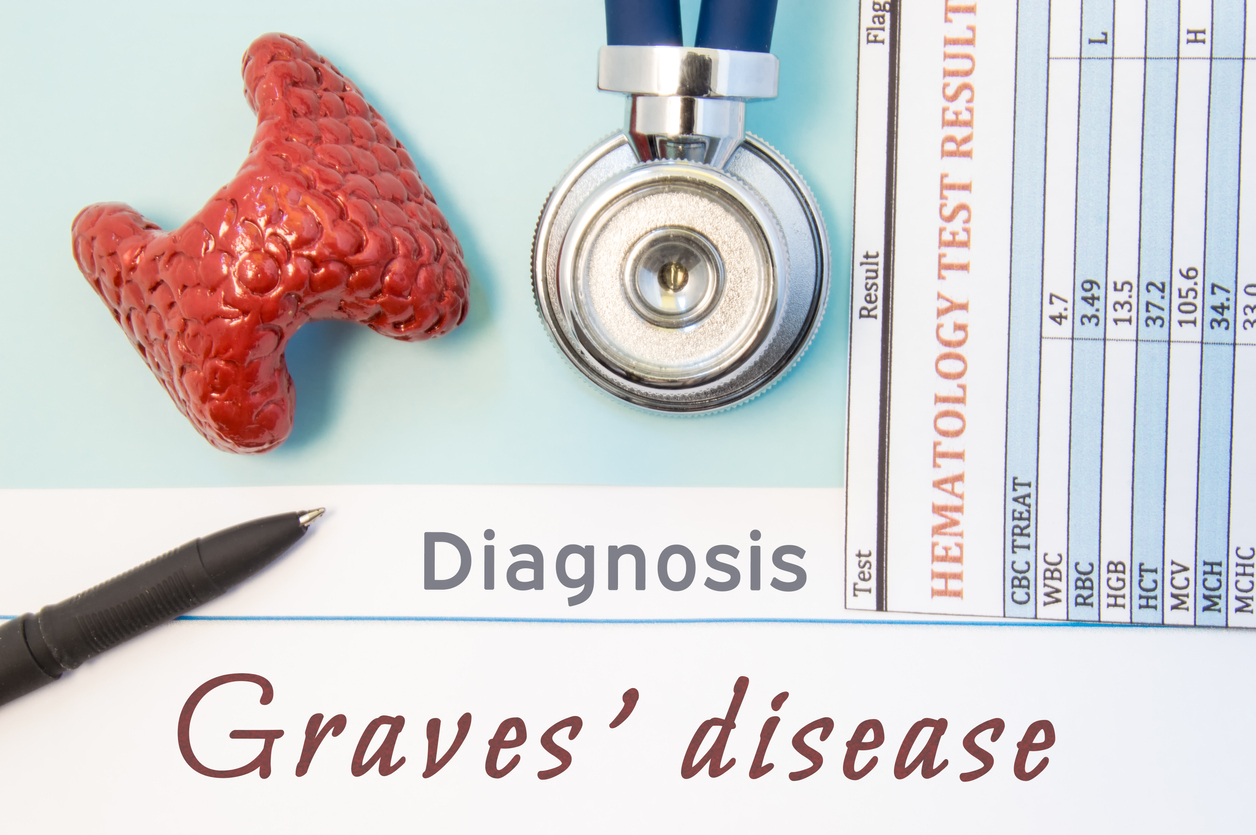The causes of Graves’ disease are not entirely known yet. What we do know is that Graves’ disease is an autoimmune disorder that causes your thyroid gland to overproduce thyroid hormones. This condition is also referred to as “hyperthyroidism.” Thyroid hormones can impact various aspects of your body. These include:
- Your nervous system
- Brain development
- Body temperature
If left untreated, hyperthyroidism can cause weight loss, emotional instability, and mental or physical fatigue.
What Causes Graves’ Disease?
While autoimmune diseases can be inherited, there’s no way to determine how exactly it is caused or who will develop it. Still, research continues to delve into this concern. While risk factors exist, the actual cause remains unknown. Below you will find the most common risk factors for Graves’ disease.
- Age: The disease most often affects people who are forty or older. While you can get the disease at any age, it’s more common in older people.
- Gender: Women are more likely than men to develop the disease.
- Genetics: Those who have close family members with Graves’ disease are at a higher risk.
- Emotional or Physical Trauma: For those who have gone through stressful events or even illnesses, Graves’ disease can be triggered.
- Pregnancy: Women who have a genetic predisposition to the disease and are currently pregnant or have recently given birth are a higher risk group for Graves’ disease.
- Smoking: Using tobacco, and smoking in general, can impact your immune system and can increase the risk of Graves’ disease.
- Autoimmune Disorders: For those who already have an autoimmune disease like rheumatoid arthritis or Type 1 diabetes, the risk is higher.
Graves’ Disease and Your Eyes
Graves’ disease can impact various structures within your eyes, including the muscles, orbital fat, and eyelids. However, symptoms of the disease begin slowly. And they can rapidly develop if untreated. So getting medical attention as soon as possible is important. Some of the symptoms include eye irritation or dryness, eye pressure, redness, eyelid swelling, eyelid retraction, and bulging or protruding eyes. One of the most uncomfortable symptoms is eye swelling, as it can be painful and is visible to others. Because vision is so important, getting treatment as soon as possible is essential for your vision and overall health.
Treatment Options
If you are experiencing any of the eye symptoms listed above, you’ll want to make an appointment with an oculoplastic surgeon. Now, patients who suffer from Graves’ disease can benefit from orbital decompression surgery. This is a minimally invasive procedure with effective results for patients. The treatment helps reduce the appearance of bulgy eyes by expanding the eye socket, and it then addresses numerous uncomfortable symptoms that accompany Graves’ disease.
The treatment for a patient with Graves’ is multidisciplinary. And it involves an:
- Endocrinologist
- Thyroid surgeon
- Ophthalmologist
- Oculoplastic surgeon
Because the underlying problem remains the thyroid gland, it must receive treatment in conjunction with any procedure that addresses the underlying issues and symptoms. While the surgery can treat the medical issue regarding your eye symptoms, you can also address the appearance of your eyes with cosmetic surgery at the same time. During your consultation, you can talk with your surgeon about your options.
Cosmetic Eye Surgeon in Beverly Hills
If you are, or think you may be, suffering from Graves’ disease and have symptoms such as bulging eyes or eye irritation, contact Taban MD. Dr. Mehryar Taban is a well-known and successful board-certified surgeon in southern California. He is one of the most trusted surgeons in the area, as he is highly educated and active in the medical community. He also has wide respect as a professor at one of the nation’s top universities, UCLA. Dr. Taban takes great pride in providing his patients with the highest quality care. Contact his office today for a consultation!

